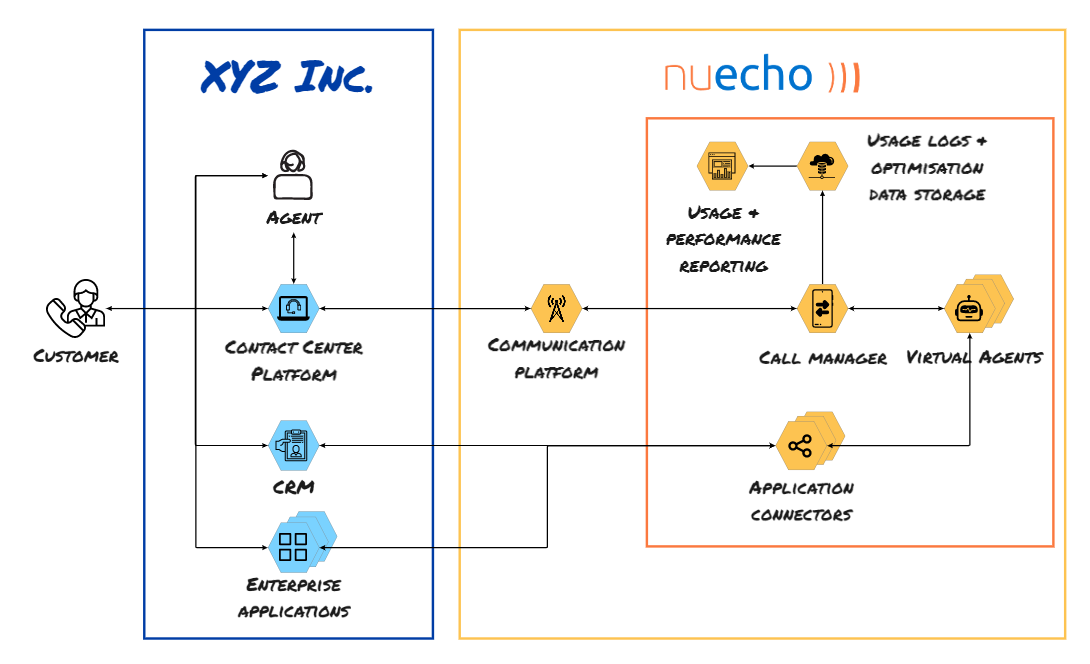As explained in a previous post on “Ladies and gentlemen, we’re experiencing some turbulence. Please hold the line while we try to find an available agent. ”, call automation solutions can help customer contact centers address several challenges at once, such as variable calls volumes and workforce shortage.
In recent years, virtual agents have benefited from outstanding technology improvements in the field of Natural Language Processing (NLP) and Artificial Intelligence (AI).
However, the complexity and the amount of effort required to leverage conversational AI platforms such as Google or Amazon still prevents many businesses from seeing a move towards virtual agents as a profitable investment. That’s where managed virtual agent solutions save the day!
By leveraging the call volumes of several customers, managed virtual agent solution providers are able to offer on-demand virtual agents much faster and at a much lower cost than the implementation of an entire conversational AI platform.
Many businesses have developed their own set of criteria when it comes to selecting an outsourced workforce but these criteria may not entirely apply when it comes to virtual agents.
When choosing a managed virtual agent solution provider, businesses should consider these 4 factors:
- Integration & security
- Voice & telephony experience
- Conversational design experience
- Continuously improving solution
Let’s explore the details of each factor and what should be expected from providers.
Integration & security
From an integration perspective, a managed virtual agent solution is similar to outsourcing your calls which involves providing a way to transfer calls to another contact center and providing them access to the systems required for the selected use cases.
The following figure provides a high-level architecture view of a managed virtual agent solution.

Hopefully, your provider will be able to integrate with your existing systems without requiring that you upgrade some of them, such as your contact center platform. You will also need to review the implications of exposing some access points to an external provider.
You will need to discuss how secure the overall integration will be as customer data and their voice interactions will be shared with this provider. You need to verify that your provider will maintain customer data (in transit and at rest) within the geographies you serve. For example, you might not want to have traffic go through the US if your business is in Canada. You also need to review the security posture of your provider. Security audits and certifications (ex. SOC 2, ISO 27001) can surely help reviewing and ensuring compliance with your requirements more quickly.
Voice & telephony experience
Providing a great conversational experience on the phone channel is more than just taking a chatbot and adding speech-to-text and text-to-speech. Voice conversations are real-time synchronous communications. There are multiple factors at play: keeping response time in milliseconds to avoid silence and awkwardness, detecting accurately the end of speech and interruptions (i.e. barge-in), handling low quality audio and noise, have great recognition accuracy even when faced with accent or people hesitating or changing their mind and being able to render natural responses.
When choosing a managed virtual agent provider, you will want to make sure that they have a lot of experience with the challenges of handling phone communications.
Conversational design experience
As mentioned regarding low satisfaction scores for some IVRs, a one-size-fits-all mentality does not usually provide a good experience. Personalisation should be part of your conversation design strategy. For example, integrating your virtual agents with a CRM can help leverage customer data and context to better understand their needs and the reason why they might be contacting you. When working with a provider, you will want to ensure that they will not just give you a cookie-cutter solution that does not provide any personalization with the conversational experience.
Focusing on the user experience should aim at reducing friction with different interactions. Unfortunately, badly designed IVRs might be too restrictive and follow a rigid structure that customers do not appreciate. While you don’t want to trick your customers into believing they are talking to a human, your goal should be to replicate as much as possible the experience of talking to a human. Letting people express themselves more naturally and capturing the required information as they speak freely is what happens in a human-to-human conversation.
You also need to consider your engagement channels with regards to the conversational design. While having an omnichannel solution is certainly desirable, businesses need to understand distinct constraints that relate to each channel. Let’s take for example an appointment booking use case with a virtual agent. If a customer wants to book an appointment on a given day where there is a lot of availability, then you could show all the times in a widget on a chat interface and let the customer review and select the proper time. But on the phone, this strategy will fail since the number of choices will be too great to just list them verbally. A voice user interface comes with several considerations that need to be incorporated in your design. Be wary of providers that tell you their virtual agents work with any channel.
Continuously improving solution
People are unpredictable. For a virtual agent solution, you need to plan that people might not interact with a virtual agent as expected. In addition, the needs of your customers can evolve with time. Just like human agents, virtual agents need some form of monitoring, quality assurance and training.
Therefore, it is important to understand that a virtual agent solution is not only about implementing and launching a solution. It involves monitoring, supporting, maintaining and optimizing the solution to adapt to your customers. You will want to make sure that your provider will be a good partner in constantly improving your solution.
You will also want to see how your provider can leverage the usage data to provide insights into the voice of your customers. As people express themselves naturally, this is a great opportunity to identify how you can better serve them. This can also help identify other use cases that could be automated.
Benefits of a managed solution
Leveraging the expertise of a partner provider of virtual agents has multiple benefits.
The most significant benefit is accelerating the time-to-value of the solution. A provider will already have possible integration connectors to your systems, have designed similar conversational agents or dialogs, have optimized difficult user inputs to recognize, … This can greatly reduce a virtual agent project time from several months to just weeks.
Defining, designing, implementing and maintaining virtual agents requires a cross-functional team and a good understanding of the latest conversational AI technologies. This expertise can greatly increase the total cost of the solution and increase the required investments. A fully managed virtual agent provider can reduce these investments and make costs more predictable.
Deploying a customer facing voice virtual assistant can be risky for businesses. According to a Rasa survey, 41% respondents reported that limited experience building virtual assistants was a barrier to conversational AI adoption and only 18% of respondents using voice assistants are in production with it. A fully managed virtual agent provider can leverage its experience to ensure the successful deployment of solutions in production.
Summing up
Automating calls through a fully managed virtual agent solution can help contact centers service their customers for simple and repetitive tasks in order to let their human agents focus on value added calls. It involves partnering with a provider and businesses should make sure that key criteria will be fulfilled by their provider.
Nu Echo has 20+ years of experience creating conversational experiences that improves operational efficiency with an exceptional customer experience. If you are interested in a managed virtual agent solution, then contact us today.


